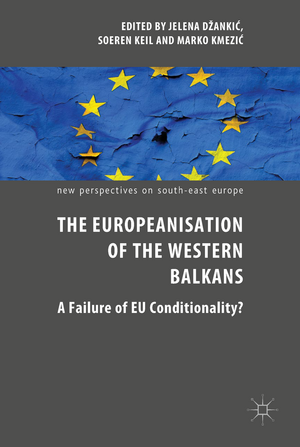The Europeanisation of the Western Balkans: A Failure of EU Conditionality?: New Perspectives on South-East Europe
Editat de Jelena Džankić, Soeren Keil, Marko Kmezićen Limba Engleză Hardback – 15 oct 2018
| Toate formatele și edițiile | Preț | Express |
|---|---|---|
| Paperback (1) | 941.38 lei 6-8 săpt. | |
| Springer International Publishing – 20 dec 2018 | 941.38 lei 6-8 săpt. | |
| Hardback (1) | 950.52 lei 6-8 săpt. | |
| Springer International Publishing – 15 oct 2018 | 950.52 lei 6-8 săpt. |
Din seria New Perspectives on South-East Europe
- 9%
 Preț: 628.07 lei
Preț: 628.07 lei - 15%
 Preț: 643.34 lei
Preț: 643.34 lei - 15%
 Preț: 646.11 lei
Preț: 646.11 lei - 15%
 Preț: 641.85 lei
Preț: 641.85 lei -
 Preț: 390.63 lei
Preț: 390.63 lei -
 Preț: 390.25 lei
Preț: 390.25 lei -
 Preț: 393.52 lei
Preț: 393.52 lei - 15%
 Preț: 642.51 lei
Preț: 642.51 lei - 15%
 Preț: 642.51 lei
Preț: 642.51 lei - 18%
 Preț: 895.56 lei
Preț: 895.56 lei - 18%
 Preț: 729.53 lei
Preț: 729.53 lei - 18%
 Preț: 777.50 lei
Preț: 777.50 lei -
 Preț: 485.24 lei
Preț: 485.24 lei - 18%
 Preț: 789.52 lei
Preț: 789.52 lei - 18%
 Preț: 791.57 lei
Preț: 791.57 lei -
 Preț: 386.81 lei
Preț: 386.81 lei -
 Preț: 393.52 lei
Preț: 393.52 lei -
 Preț: 388.90 lei
Preț: 388.90 lei -
 Preț: 387.20 lei
Preț: 387.20 lei
Preț: 950.52 lei
Preț vechi: 1159.17 lei
-18% Nou
Puncte Express: 1426
Preț estimativ în valută:
181.88€ • 190.29$ • 151.09£
181.88€ • 190.29$ • 151.09£
Carte tipărită la comandă
Livrare economică 03-17 aprilie
Preluare comenzi: 021 569.72.76
Specificații
ISBN-13: 9783319914114
ISBN-10: 3319914111
Pagini: 236
Ilustrații: XVII, 251 p. 7 illus. in color.
Dimensiuni: 148 x 210 mm
Greutate: 0.59 kg
Ediția:1st ed. 2019
Editura: Springer International Publishing
Colecția Palgrave Macmillan
Seria New Perspectives on South-East Europe
Locul publicării:Cham, Switzerland
ISBN-10: 3319914111
Pagini: 236
Ilustrații: XVII, 251 p. 7 illus. in color.
Dimensiuni: 148 x 210 mm
Greutate: 0.59 kg
Ediția:1st ed. 2019
Editura: Springer International Publishing
Colecția Palgrave Macmillan
Seria New Perspectives on South-East Europe
Locul publicării:Cham, Switzerland
Cuprins
1. Introduction: The Europeanisation of the Western Balkans.- 2. European Union Conditionality in the Western Balkans: External Incentives and Europeanisation.- 3. Chips off the old block - Europeanisation of the Foreign Policies of Western Balkan states.- 4. EU Enlargement and State Capture in the Western Balkans.- 5. EU Rule of Law Conditionality: Democracy or ‘Stabilitocracy’ Promotion in the Western Balkans?.- 6. The Europeanisation of Minority Policies in the Western Balkans.- 7. Ethnicisation vs. Europeanisation: Promoting Good Governance in Divided States.- 8. Tolerating Semi-Authoritarianism? Contextualising the EU’s Relationship with Serbia and Kosovo.- 9. The Europeanisation of Contested States - Comparing Bosnia and Herzegovina, Macedonia and Montenegro.- 10. Economic integration of the Western Balkans into the European Union: The role of EU policies.- 11. Conclusion: Rethinking Europeanisation.
Notă biografică
Jelena Džankić is Research Fellow and Coordinator of the Global Citizenship Observatory (GLOBALCIT) at the Robert Schuman Centre for Advanced Studies at the European University Institute (EUI), Italy.
Soeren Keil is Reader in Politics and International Relations at Canterbury Christ Church University in Kent, UK.
Marko Kmezić is Assistant Professor at the Centre for Southeast European Studies at the University of Graz, Austria.
Textul de pe ultima copertă
This volume casts a fresh look on how the political spaces of the Western Balkan states (Croatia, Bosnia and Herzegovina, Serbia, Montenegro, Kosovo, Macedonia and Albania) are shaped, governed and transformed during the EU accession process. The contributors argue that EU conditionality in the Western Balkans does not work ‘effectively’ in terms of social change because rule transfer remains a ‘contested’ business, due to veto-players on the ground and strong legacies of the past. The volume examines specific policy areas, salient in the enlargement process and to a different degree incorporated in the accession criteria, as well as EU foreign policy in the spheres of post-conflict stabilisation, democratization and the rule of law promotion.
Soeren Keil is Reader in Politics and International Relations at Canterbury Christ Church University in Kent, UK.
Marko Kmezić is Assistant Professor at the Centre for Southeast European Studies at the University of Graz, Austria.
Caracteristici
Addresses the changing nature of the concept of democratisation Underlines the difference in the effects of Europeanisation in the Western Balkans from those in Central and East Europe in the 2004 and 2007 enlargements Makes an impact on the policy strategy for the accession processes in the Western Balkans
